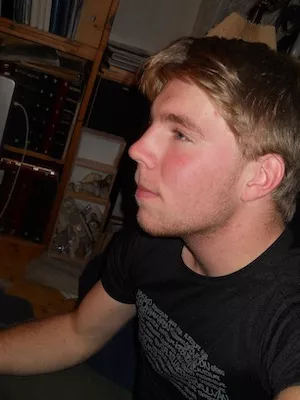
Torbjörn Lundberg
Doctoral student, Master of Science

This is my personal webpage at the division where you find contact information, a brief summary of my work, and links to previous publications.
Research
I am working in the field of theoretical particle physics. My main topics of interest is the study of thermal quantum field theory and its effect on observables as well as the development of event generators that are capable of handling collisions between heavy ions. My master's thesis concerns temperature effects on particle decay rates for processes taking place within a medium. My PhD studies aim to investigate and compare fundamental assumptions of different modeling schemes made in order to simulate heavy-ion collsions. A specific formalism with associated simulation program PYTHIA/Angantyr, that relies on the Lund String model, makes up the foundations of my work.
I currently work with professor Leif Lönnblad with the intent of contributing to the development of event generators (mainly PYTHIA8) for heavy-ion collisions that are based on the Lund String model. My first project aims to implement a new type of interactions between pairs of dipoles that will later on form Lund strings. In recent publications, it has been shown that string interactions before the onset of hadronisation qualitatively produces effects conventionally attributed to hydrodynamical flow and we are interested in pushing this 'microscopic' approach as far as is reasonable.
In parallell, I was involved with a reviewing project under the supervision of associate professor Roman Pasechnik where we investigated a naïve Z2-symmetry of the effective pure Yang-Mills Lagrangian and the consequences of such symmetry on the value of the cosmological constant. This project resulted in a publication by Andrea Addazi, T.L., Antonino Marcianò, Roman Pasechnik and Michal Šumbera.
My master's project was performed under the supervision of associate professor Roman Pasechnik and we investigated generic decay rates of (pseudo)scalars and fermions in a thermal medium. Explicit one-loop calculations for Yukawa-type theories were carried out by hand within the framework of equilibrated real-time thermal field theory. Fundamental differences for decay rates of (pseudo)scalars and fermions in the medium compared to when the same decays takes place in the vacuum were identifield. The project resulted in a publication by T. L. and Roman Pasechnik.
I mainly prefer working with well-founded equations when such luxary is available and I enjoy spending time on emerging myself in any topic. Hence, I often read a lot of material before I am comfortable with developing new thoughts.
Teaching
I have been engaged as a teacher assistant on the following courses:
- FYTN03 Computational Physics
- FYTN10 Introduction to Quantum Field Theory
- FYTN14 Introduction to Artificial Neural Networks and Deep Learning
- MNXA19 The Scientific Method
Outreach
I am regularly lecturing during the NMT days that are organised by the Faculty of Science, the Faculty of Medicine, and the Faculty of Engineering.
Publications
Displaying of publications. Sorted by year, then title.
Cosmology from Strong Interactions
Andrea Addazi, Torbjörn Lundberg, Antonino Marcianò, Roman Pasechnik, Michal Šumbera
(2022) Universe, 8
Journal article reviewThermal Field Theory in real-time formalism : concepts and applications for particle decays
Torbjörn Lundberg, Roman Pasechnik
(2021) European Physical Journal A, 57
Journal article review

